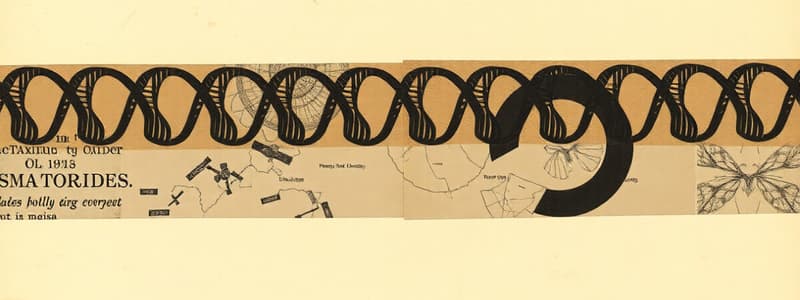Podcast
Questions and Answers
What is a key characteristic of cells that undergo mitosis?
What is a key characteristic of cells that undergo mitosis?
- They are haploid cells.
- They are usually larger than other cells.
- They can only reproduce asexually.
- They contain two sets of chromosomes. (correct)
What could happen if cells spent more time in mitosis than in interphase?
What could happen if cells spent more time in mitosis than in interphase?
- It could lead to uncontrolled cell growth or cancer. (correct)
- The efficiency of DNA replication would increase.
- Cell growth and preparation for division would be enhanced.
- Cellular respiration would become more effective.
Which of the following descriptions is accurate for a chromosome during mitosis?
Which of the following descriptions is accurate for a chromosome during mitosis?
- A structure that only exists during interphase.
- A pair of sister chromatids joined at the centromere. (correct)
- An uncoiled chromatin that becomes visible.
- A single DNA strand with no associated proteins.
What is the primary purpose of mitosis in the body?
What is the primary purpose of mitosis in the body?
What does 'diploid' refer to in the context of mitosis?
What does 'diploid' refer to in the context of mitosis?
Flashcards
Mitosis
Mitosis
A type of cell division that creates two identical daughter cells from a single parent cell.
Cell Cycle
Cell Cycle
The series of events that take place in a cell leading to its division and duplication.
Chromosome
Chromosome
A thread-like structure of DNA that carries genetic information.
Diploid Cell
Diploid Cell
Signup and view all the flashcards
Mitosis Stages
Mitosis Stages
Signup and view all the flashcards
Study Notes
Mitosis: Cell Division
- Mitosis is a cell division process that produces body cells.
- Certain cell types, like nerve and muscle cells, do not undergo mitosis.
- Mitosis is essential for growth and repair in the body.
- It ensures that cells have the correct number of chromosomes.
- Mitosis is part of the cell cycle. Interphase is the larger portion of the cell cycle.
- If mitosis occurred more than interphase, cells would be in a constant cycle of division.
Importance of Mitosis
- Mitosis is crucial for growth and repair in the body.
- It ensures cells have the correct number of chromosomes.
Chromosome Structure
- Chromosomes are made of proteins and DNA.
Mitosis Process Stages and Outcomes
- Mitosis begins and ends with diploid cells, meaning they have two sets of chromosomes from each parent.
- In humans, diploid cells have 46 chromosomes in each cell.
- Mitosis ensures that each new cell created has the same number of identical chromosomes.
- Illustration shows that cells created have identical chromosomes.
Studying That Suits You
Use AI to generate personalized quizzes and flashcards to suit your learning preferences.
Related Documents
Description
This quiz explores the process of mitosis, a vital cell division mechanism that produces body cells. Learn about the stages of mitosis, its significance for growth and repair, and the structure of chromosomes. Test your understanding of these fundamental concepts of biology.




